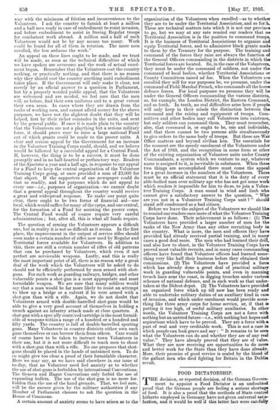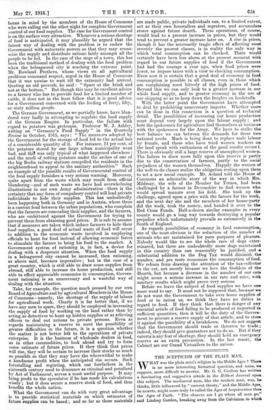FOOD DICTATORSHIP.
THE decision, or reported decision, of the German Govern- ment to appoint a Food Dictator is an undoubted proof that the German people are feeling a serious shortage of food. It is also a proof that the methods of State control hitherto employed in Germany have not given universal satis- faction, and it would be well if this latter fact were carefully borne in mind by the members of the House of Commons who were calling out the other night for complete Government control of our food supplies. The case for Government control is on the surface very attractive. Whenever a serious shortage of food is anticipated, it may plausibly be argued that the fairest way of dealing with the problem is to endow the Government with autocratic powers so that they may econo- mize the supply and distribute rations fairly amongst all the people to be fed. In the case of the siege of a town, this has been the traditional method of dealing with the food problem when the beleaguered city is reaching the extreme point.
Mr. Rowland Prothero, whose views on all agricultural problems command respect, urged in the House of Commons that it was unwise to wait till the extremity had arrived. Quoting an old proverb, he said : " Spare at the brink and not at the bottom." But though this may be excellent advice to a farmer who has to provide food for a limited number of cattle, it does not in the least follow that it is good advice for a Government concerned with the feeding of forty, fifty, or sixty million people.
The German Government, as we partially know, have blun- dered very badly in attempting to regulate the food supply of the German Empire. In particular, the failure with regard to potatoes was grotesque. Professor W. J. Ashley, writing on " Germany's Food Supply " in the Quarterly Review in October, 1915, says : " The measu res adopted by the Government for the storage of food led to the actual loss of a considerable quantity of it. For instance, 14 per cent. of the potatoes stored by one large urban municipality went bad, and thil was only typical of what happened elsewhere ; and the smell of rotting potatoes under the arches of one of the big Berlin railway stations compelled the residents in the neighbourhood to appeal to the sanitary authorities." Such an example of the possible results of Governmental control of the food supply furnishes a very serious warning. Moreover, quite apart from the waste which may result from official blundering—and of such waste we have had overwhelming illustrations in our own Army administration—there is the certainty that any form of compulsory control will lead private individuals to hide their supplies. This has undoubtedly been happening both in Germany and in Austria, where there is a current feud between the urban populations, who complain that the farmers are concealing their supplies, and the farmers, who are embittered against the Government for trying to prevent them from obtaining good prices. It is safe to assume that if measures are taken which induce farmers to hide their food supplies, a good deal of actual waste of food will occur in addition to the economic waste involved in employing officials to hunt for food instead of allowing economic forces to stimulate the farmer to bring his food to the market. A Government system of rationing is, in fact, a device for dealing with a desperate situation. When the food supply in a beleaguered city cannot be increased, then rationing, as above said, becomes imperative ; but in the case of a great country, which is still able to draw some supplies from abroad, still able to increase its home production, and still able to effect appreciable economies in consumption, Govern- ment rationing is an unnecessary and a wasteful way of dealing with the situation.
Take, for example, the question much pressed by our own Board of Agriculture and by agricultural Members in the House of Commons—namely, the shortage of the supply of labour for agricultural work. Clearly it is far better that, if we have any men to spare, they should be employed in increasing the supply of food by working on the land rather than by acting as detectives to hunt up hidden supplies or as relieving officers to deal out rations to private persons. Even as regards maintaining a reserve to meet the possibility of greater difficulties in the future, it is a question whether the matter is not better left to the operations of private enterprise. It is the business of wholesale dealers in food, as in other commodities, to look ahead and try to form some estimate of future prices. If they think that prices tvill rise, they will be certain to increase their stocks as much as possible so that they may have the wherewithal to make a handsome profit when the anticipated rise occurs. Such forestalling and regrating, which our forefathers in the sixteenth century used to denounce as criminal and penalized by Act of Parliament, serves a most useful purpose. It may bring profit to the speculator if he has made his calculations wisely ; but it does secure a reserve stock of food, and thus benefits the whole nation.
What the Government can do with very great advantage Is to provide statistical materials on which estimates of future supplies can be based ; and so far as these materials are made public, private individuals can, to a limited extent, act as their own forestallers and regraters, and accumulate stores against future dearth. These operations, of course, would lead to a present increase in prices, but they would tend to prevent a greater increase later on. A rise in prices, though it has the necessarily tragic effect of affecting most severely the poorest classes, is in reality the only way in which total consumption can be checked. There would certainly have been less alarm at the present moment with regard to our future supplies of food if the Government had had the courage a year ago, when food prices were lower, to impose taxes with a view to checking consumption. Even now it is certain that a good deal of economy in food consumption is possible in all classes, even in those which are complaining most bitterly of the high prices of food. Beyond this we can only look to a greater increase in our whole food supply, and to greater economy in the use of our shipping so as to keep down the freights on foodstuffs. With the latter point the Government have attempted to deal by prohibiting unnecessary imports. Whether more can be done in this connexion is a question of technical detail. The possibilities of increasing our home production must depend very largely upon the labour supply ; and here the spokesmen for agriculture find themselves at variance, with the spokesmen for the Army. We have to strike the best balance we can between the demands for these two national needs. Much is being done to replace male labour by female, and those who have tried women workers on the land speak with enthusiasm of the good results secured. There is obviously still a large reserve of unemployed women. The failure to draw more fully upon this reserve is partly due to the conservatism of farmers, partly to the social prejudices of the women themselves. Happily the women of the well-to-do classes realize the obligation resting upon them to set a new social example. Mr. Acland told the House of Commons an admirable story of the way in which Mrs. Mildmay, the wife of the Member for Totncs, had been challenged by a farmer in Devonshire to find women who would spread manure over his field. She took up the challenge, agreed upon a price with the farmer for the work, and the next day she and the members of her house-party did the work, took the money, and handed it over to the Red Cross Funds. Half-a-dozen similar examples in every county would go a long way towards destroying a popular prejudice which unfortunately prevails so extensively in the South of England. As regards possibilities of economy in food consumption, one of the most obvious is the reduction of the number of animals who are maintained for pure purposes of pleasure. Nobody would like to see the whole race of dogs exter- minated, but there are undoubtedly more dogs maintained in this country than can reasonably be justified, and a substantial addition to the Dog Tax would diminish the number, and pro tont° economize the consumption of food. We refrain from drawing the attention of the tax-collector to the cat, not merely because we love the Goddess of the Hearth, but because a decrease in the number of our cats might mean a serious increase in our rats and mice, with sanitary results which might prove very serious. Before we leave the subject of food supplies we have one more word to say. It must not be supposed that, because we do not want the Government to take over home supplies of food or to ration us, we think they have no duties in regard to food. If they think that there is danger of any essential article of food failing to be produced or imported in sufficient quantities, then it will be the duty of the Govern- ment to procure a reserve supply of that article, and to store it against the possibility of a breakdown. We do not suggest that the Government should trade or threaten to trade ; indeed, they should give guarantees not to do so. But if they entertain any fear of shortage, they should hold an emergency reserve as an extra precaution. In the last resort, the Cabinet are our Grand Victuallers to the nation.































 Previous page
Previous page